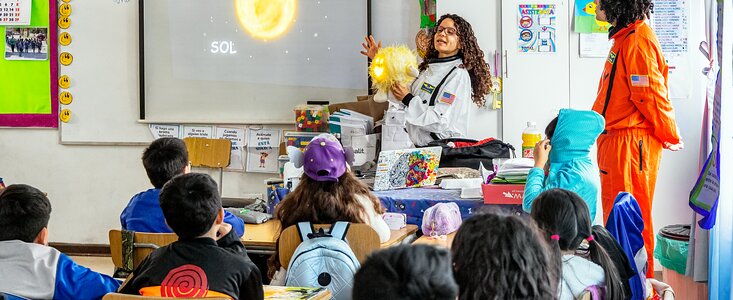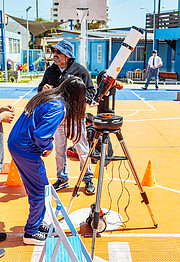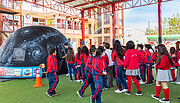Viaje al Universo 2023 Brings Students to the Forefront of Astronomy in Chile
Another successful Viaje program led students in La Serena and Coquimbo through a week of fun science education
25 October 2023
More than 2,500 students and 115 teachers participated in the activities of Viaje al Universo 2023, which took place from October 16 and 20 in La Serena and Coquimbo in Chile. Viaje is one of NSF NOIRLab’s core educational programs, whose main goal is to bring astronomers, scientists, engineers and the staff of our observatories into the local classrooms.
This year’s program included 37 activities implemented in 5 schools. All the activities of Viaje are aligned with the Chilean educational curriculum in order to provide a tangible contribution to the teaching and learning of science, physics and astronomy in Chile.
Teachers and students were excited by all of the engaging activities, which included workshops, science talks and a portable planetarium from the Giant Magellan Telescope, and a solar telescope to experience a real time observation of the closest star, the Sun. These activities were led by NOIRLab education and engagement staff along with the support of technical staff from the telescopes that AURA/NOIRLab operates in Chile.
As in years previous, NOIRLab invited its partners in Chile to participate in Viaje. PhD students from the Astronomy Department of the Universidad de La Serena participated actively in this program, as well as the specially-invited “Ingeniosas”, a Chilean non-profit organization that promotes STEM education amid girls and teens in schools throughout Chile. Both partners provided valuable support that allowed Viaje to reach as many students as possible.
“This year’s program returned to a full face-to-face mode and gave us the chance to interact with students and share with them NOIRLab’s breakthrough discoveries in astronomy and astrophysics in the most direct way,” said Manuel Paredes, Chile Outreach Manager. “We also saw great benefit from involving our own staff to lead the workshops as they are the stars of what we do to understand our Universe.”
More information
NSF NOIRLab, the US center for ground-based optical-infrared astronomy, operates the international Gemini Observatory (a facility of NSF, NRC–Canada, ANID–Chile, MCTIC–Brazil, MINCyT–Argentina, and KASI–Republic of Korea), Kitt Peak National Observatory (KPNO), Cerro Tololo Inter-American Observatory (CTIO), the Community Science and Data Center (CSDC), and Vera C. Rubin Observatory (operated in cooperation with the Department of Energy’s SLAC National Accelerator Laboratory). It is managed by the Association of Universities for Research in Astronomy (AURA) under a cooperative agreement with NSF and is headquartered in Tucson, Arizona. The astronomical community is honored to have the opportunity to conduct astronomical research on Iolkam Du’ag (Kitt Peak) in Arizona, on Maunakea in Hawai‘i, and on Cerro Tololo and Cerro Pachón in Chile. We recognize and acknowledge the very significant cultural role and reverence that these sites have to the Tohono O'odham Nation, to the Native Hawaiian community, and to the local communities in Chile, respectively.
Links
Contacts
Manuel Paredes
Outreach Manager Chile
NSF NOIRLab
T: +56 51205 671
Email: manuel.paredes@noirlab.edu






